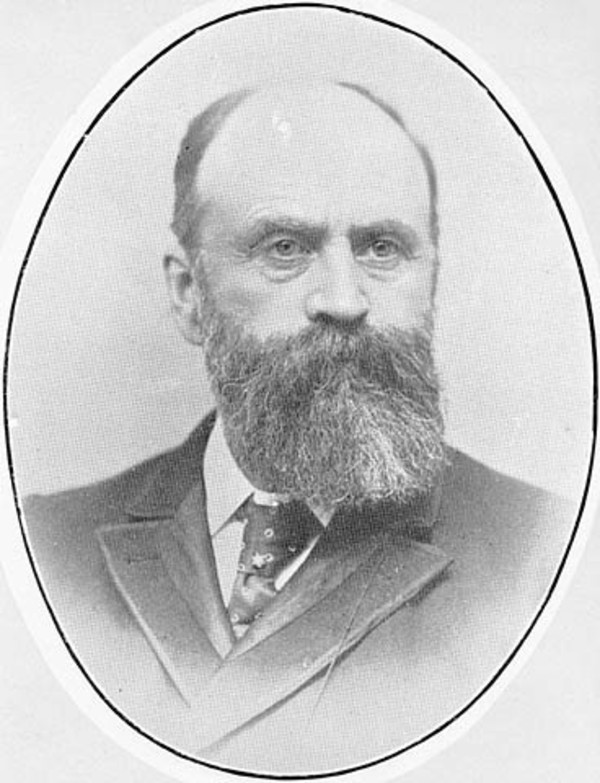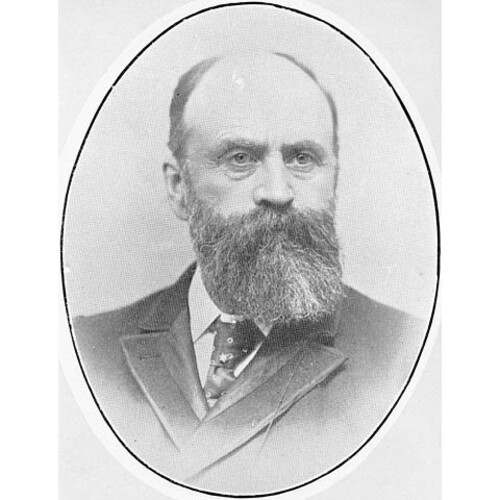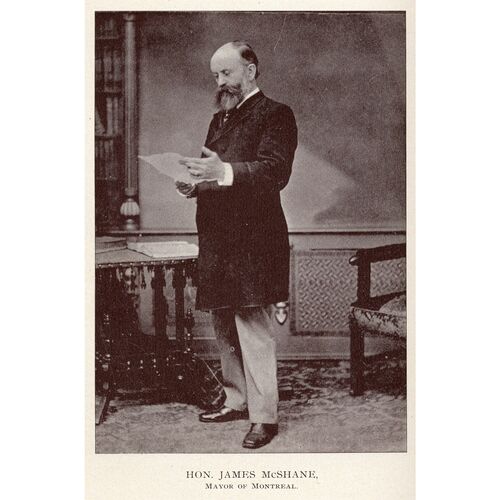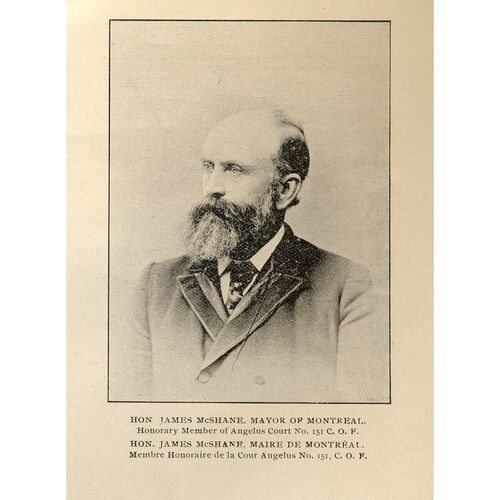McSHANE, JAMES, businessman and politician; b. 7 Nov. 1833 in Montreal, son of James McShane, a day-labourer, and Ellen Quinn; m. there first 13 Jan. 1863 Elizabeth Derragh; m. secondly 8 Jan. 1868 Josephine Katheline Miron in Plattsburgh, N.Y.; d. 14 Dec. 1918 in Montreal.
James McShane began his education under Daniel Mahoney, a schoolteacher, and went on to study at the Petit Séminaire de Montréal in 1847–48. At the age of 18 he went into business with his father, who had become a major livestock dealer and meat exporter. Their company’s customers included the Allan Line [see Sir Hugh Allan*] and the British troops quartered in Montreal. From 1870 to 1874 McShane worked as a stockbroker at the Montreal Stock Exchange and in 1874, in partnership with a Mr Roddick of Liverpool, he made a name for himself as an exporter of livestock to England. Later he would become a member of the Montreal and Chicago boards of trade.
McShane was a prominent figure in Montreal public life. In 1863 he was appointed a justice of the peace through the influence of Thomas D’Arcy McGee*. As a resident of Griffintown (Montreal), he represented his fellow Irish Canadians in every office he held. He also served in the volunteer militia during the Fenian raids in 1866 and would be decorated for his action.
The prosperity he had achieved and the good reputation he enjoyed led McShane (or the People’s Jimmy, as the Irish called him) to venture into the political arena in 1868. He represented Sainte-Anne ward on the Montreal city council from 1868 to 1873 and was an alderman from 1874 until 13 May 1881, when he was declared incapable of holding office. He returned to council in 1883 and was re-elected for a further term, but resigned on 14 March 1887.
In 1891, eager to win the mayoralty of Montreal, McShane started Le Progrès municipal, a newspaper that appeared only in January and February. Jacques Grenier*, who had been elected mayor twice by acclamation, hoped to hold on to office. In response to the protests of the English-speaking community, which was demanding an anglophone mayor in accordance with the custom of alternation, McShane entered the race. Thus it became a battle between an English-speaking and a French-speaking Liberal. French Canadian Conservatives, who had a grudge against French Canadian Liberals, used all their influence to teach Grenier a lesson. McShane won easily by a vote of 10,297 to 5,166.
Under McShane’s administration, three aldermen, Raymond Préfontaine*, Henri-Benjamin Rainville, and Cléophas Beausoleil*, who were close to Premier Honoré Mercier*, operated one of those “comradely republics where bribery flourishes.” The mayor either shut his eyes or was part of it himself. The French-speaking aldermen would be targeted by George Washington Stephens*, an mla who kept close watch on city hall affairs from 1892. With his group of “reformers,” he exposed the Préfontaine clique, although he took care not to attack the mayor.
The French-speaking community, which had supported McShane’s re-election by acclamation in 1892, then demanded a francophone mayor. At the end of his second term, however, McShane indicated he intended to run again. Senator Alphonse Desjardins announced his candidacy. McShane obtained an injunction against the election. Ignoring it, the city clerk ordered that an election be held, and on 1 Feb. 1893 Desjardins won by 156 votes. McShane did not accept his defeat. He took the mayor’s chain of office from the city hall, and a court order was required to force him to return it. In February 1894 he attempted a comeback. This time his opponent was Joseph-Octave Villeneuve*, the former mayor of Saint-Jean-Baptiste, and he was again defeated.
Along with his career in municipal politics, McShane was active on the provincial scene. After failing to win a seat for Montreal West as a Liberal in a provincial by-election on 22 Aug. 1873, he met with more success in 1878. He was re-elected in 1881 and was returned for Montreal Centre in 1886. Although his seat was declared vacant when he was appointed to the cabinet in 1887, he won the by-election of 12 February by acclamation. He was acclaimed in Montreal, Division No.6, in 1890, but was defeated there in 1892.
When Mercier had become premier on 29 Jan. 1887, he had appointed McShane commissioner of agriculture and public works, but McShane held this post only until 23 March 1888. His departure took the public by surprise, since he had been very close to Mercier. He had been forced to resign as a result of a gaffe. After Mercier had made a speech in favour of a tramways bill that aroused considerable opposition in Montreal, McShane had exclaimed, “No honest man can vote for that bill,” and thereby killed the measure, dooming himself to resignation. The premier’s entourage never pardoned him for this untimely outburst and compelled Mercier to choose between his close supporters and McShane.
After his reverses in provincial politics and as mayor of Montreal, McShane moved on to a career in the federal parliament, becoming the Liberal mp for Montreal Centre in a by-election on 27 Dec. 1895. In that contest he defeated Sir William Hales Hingston*, another former mayor of Montreal, but he lost in the general election of the following year.
His political career over, McShane went back to business matters, and in particular the Montreal Harbour Commission. He would serve as harbour-master from 1900 to 1912. With the improvements made during the previous decade, Montreal was now the number-one port in Canada. Under McShane’s management, many modern installations were added. The increase in the grain trade led to construction of permanent elevators. In 1907 the harbour commission created a department of transport with sole responsibility for railway traffic within the port, a responsibility previously assigned to the various railway companies. In 1908 the commission acquired its own locomotives.
Montreal then became one of the leading shipbuilding centres in Canada. The commission provided Canadian Vickers Limited with a site near the mouth of Molson Creek. Here Vickers created a basin in which a floating dry dock was built. Over the years many more installations were added to the port facilities: an extension of the protecting wall, the Mackay jetty, and coal towers. Other changes included the adoption of firefighting measures, construction of a sawmill, and purchase of a floating crane and tugboats. The first decade of the century saw spectacular progress. It was at this time that the port took on the appearance it has in the 1990s.
In addition to his public duties, James McShane was active in a number of social organizations, in which he held various executive offices. He was a member of the board of the Montreal General Hospital (1890–1917) and of the Shamrock Amateur Athletic Association, as well as vice-president of the St Patrick’s Society.
ANQ-M, CE1-51, 10 nov. 1833; CE1-52, 13 janv. 1863. Arch. de la Ville de Montréal, D026.14 (dossier hist., James McShane). Robert Comeau, “La venue du tramway électrique oblige la vine à déneiger,” La Presse, 31 mai 1992. Le Monde illustré (Montréal), 11 juin 1887. Montreal Daily Star, 12 April 1881. La Patrie, 21 févr. 1900. La Presse, 31 janv. 1894, 21 févr. 1900, 8 janv. 1904, 6 nov. 1913. Canadian directory of parl. (Johnson). DPQ. J.-C. Lamothe, Histoire de la corporation de la cité de Montréal depuis son origine jusqu’à nos jours . . . (Montréal, 1903). P.-A. Linteau, “Le développement du port de Montréal au début du 20e siècle,” CHA, Hist. papers, 1972: 181–205. “Maîtres du port de Montréal, 1839–1954,” BRH, 60 (1954): 97. Rumilly, Hist. de Montréal. Léon Trépanier, “Figures de maires,” Cahiers des Dix, 20 (1955): 176–77; 23 (1958): 271–75, 278.
Cite This Article
Robert Comeau, “McSHANE, JAMES,” in Dictionary of Canadian Biography, vol. 14, University of Toronto/Université Laval, 2003–, accessed December 20, 2025, https://www.biographi.ca/en/bio/mcshane_james_14E.html.
The citation above shows the format for footnotes and endnotes according to the Chicago manual of style (16th edition). Information to be used in other citation formats:
| Permalink: | https://www.biographi.ca/en/bio/mcshane_james_14E.html |
| Author of Article: | Robert Comeau |
| Title of Article: | McSHANE, JAMES |
| Publication Name: | Dictionary of Canadian Biography, vol. 14 |
| Publisher: | University of Toronto/Université Laval |
| Year of publication: | 1998 |
| Year of revision: | 1998 |
| Access Date: | December 20, 2025 |






